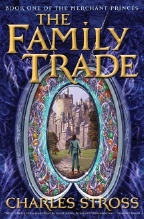The Family Trade
Charles Stross
Tor / Tom Doherty Associates
US Hardcover First Edition
ISBN 0-765-30929-7
Publication Date: 12-01-2004
304 Pages; $24.95
Date Reviewed: 11-18-04
Reviewed by: Rick Kleffel © 2004

REFERENCES
COLUMNS
|
|
|
The Family TradeCharles StrossTor / Tom Doherty AssociatesUS Hardcover First EditionISBN 0-765-30929-7Publication Date: 12-01-2004304 Pages; $24.95Date Reviewed: 11-18-04Reviewed by: Rick Kleffel © 2004 |
|
|
REFERENCES |
COLUMNS |
Fantasy fiction often wants to immerse the reader in another world, and as often as not, that world is depicted as having a medieval level of technology. Presented with all these medieval worlds, where technology is trapped in a very tight box, readers can't help but think outside the box. When you read about a huge swordfight, the mind conjures up rifles and handguns in response. When we're shown magic, we can't help but respond with a vision of technology. "Damn," you think as you read of awesome wizardly duels, "why can't these guys conjure up a toilet?"
Charles Stross conjures up a toilet and a good deal more in his non-fantasy epic 'The Family Trade'. Make no mistake about it. You're going to find this novel shelved with the science fiction and fantasy. But it reads more like a fast-paced mafia conspiracy thriller, shot through with engaging characters and entertaining humor. Stross wisely restrains his imagination to the realm of the "Well, why don't they...?" He leaves magic in the dust with fluffy bunnies and unicorns. 'The Family Trade' is a hardheaded look at the consequences of a single fantastic idea. On both sides of that fantastic idea, readers will find toe-tapping conspiracies, fiscal shenanigans, and spunky heroines solving crimes and preventing their own murders. It's a brilliant re-imagining of the contemporary American thriller, with a nice twist that provides a kaleidoscopic expansion of the plotting possibilities.
Miriam Beckstein is a successful business reporter, who, as the novel begins, has unearthed a huge (and fascinatingly conceived) money-laundering scheme. She brings the story to her editor, and by the time she returns to her desk, the security guards are waiting to escort her and her data-miner out of the building. She's ruffled the wrong feathers. Feeling blue, she goes to visit her adoptive mother, who gives her a locket from her murdered birth mother. Miriam opens the locket and stares at the pattern within, only to find herself transported to another version of our world, a version where America is sparsely populated by people living at a mediaeval level and ruled by her family, those who, like her, can walk between worlds. As she discovers, there are many implications to 'The Family Trade'.
The key to this novel is the entertaining and breezy prose style that Stross uses to draw his characters and frame the action. Shot through with humor, fascinating (but not overly complex) ideas, and expertly paced, Stross writes bestseller prose that's compelling and quite fun to read. 'The Family Trade' is a relentless page-turner that feels a couple of cuts above relentless page-turners.
By starting out the action in our world, a world we can all identify, and taking our 20th-century heroine on a whirlwind tour of his alternate earth, Stross makes his work immediate and accessible. Anyone who picks up this novel and starts it will enjoy being with Miriam so much, they'll be willing to follow her wherever she goes. And where she goes is not all that odd. It's just -- medieval. There is no magic beyond the maguffin that gets her and others from that world to this one, and all the questions you want to ask about the how and why and who of the power of walking between the worlds are quickly asked by the characters and just about as quickly, answered.
Miriam is a great character, and she'll appeal to a wide variety of readers, particularly to those who enjoy modern American female sleuths like Sharon McCone. She's plainspoken and quick thinking, portrayed with a sense of humor and flair for the dramatic. Paulette, her data-miner in this world is similarly smart and snappy. Meanwhile over in the alternate world, Roland is her man of choice, a sort of maverick who tries to bring reform to the land of his birth. And there are plenty of interesting schemers like Duke Angbard, with a multiplicity of motives and purposes.
Readers who enjoy the penchant for intelligent speculation that's marked other novels by Stross will be happy to find it here, albeit in a rather different form. Instead of cutting edge physics, Stross uses 'The Family Trade' to speculate about economic and criminal matters. But he's just as sharp in matters of money and making money move illegally as he is when discussing quantum theory, and he's much more comprehensible. He breezily and entertainingly cuts to the quick, asking the hard questions and then facing up to the hard answers. He gets in riffs on capitalism, socialism, and free trade theory as Miriam and Roland try to realize the full potential of the family's power. It's a truly ripping and thought-provoking yarn.
The economy that Stross displays does have one significant price. At 304 pages, 'The Family Trade' should have been longer. In fact, as opposed to 'Iron Sunrise', which feels like a 600 page book crammed into 350 pages, this novel is clearly the first half of a 600 page book. Stross informs me that this is the publisher's decision, not his. The conclusion is not particularly conclusive, and though a number of puzzles are solved, more are created or left hanging for the next installment, due out in June of next year. Still, anyway you look at it, Stross has created a very satisfying character and set-up. 'The Family Trade' could very well be a bestselling novel, and maybe not in just an alternate fantasy world. It's got the right mixture to appeal to a wide variety of readers in this world.